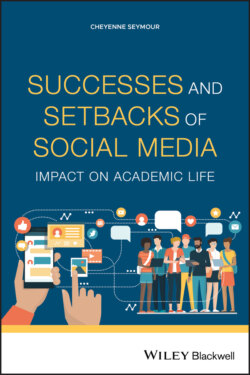Читать книгу Successes and Setbacks of Social Media - Группа авторов - Страница 20
Posting for Progress
ОглавлениеLaKisha Grant-Washington
LaKisha Grant-Washington, EdD is a Psychology Instructor at Tunxis Community College. She has a doctorate in Education from New England College; a Master of Science degree in Forensic Psychology from American International College; and a Bachelor of Arts degree in Psychology from Central Connecticut State University. Dr. Grant-Washington has 20 years’ experience in the human/social services and education sectors working with at-risk youth, ex-offenders, first-generation college students, non-traditional students, and new professionals. She has served as a case manager, intervention specialist, and program coordinator in two federally qualified health centers (FQHC). Dr. Grant-Washington has held multiple roles at the community college and university levels to include academic advisor, case manager, program coordinator, and program director. She began her professional career as a substance abuse counselor in a women’s residential treatment facility serving individuals with a history of domestic violence, substance abuse/use, mental health disorders, and criminal justice involvement.
When I began my search for a doctoral program, student supports and academic rigor were top requirements in selecting the right program and educational institution. As a student services professional, it was very important for me to identify and select a program that would be able to provide the flexibility (as I planned to continue to work full-time during enrollment) and support services (advisement and guidance) that I knew I would need to be successful. The selection of a hybrid low-residency program appeared to meet the criteria. Reflecting now, I realize it never occurred to me what a tremendous magnitude of peer interaction and support would be needed and how it would enhance my experience.
As a hybrid low-residency program, we would have a blend of instruction and course engagement using the college’s learning management system coupled with monthly in-person residency weekends. The program began with a slow rollout in July, a remote program orientation, and our first (and only) completely online course. I navigated this course well by creating my own structure, based on assignment due dates, and other aspects as identified in the syllabus. It was in the first week-long residency that I realized the influence and importance that peer support would have on my doctoral process. My cohort spent the week getting to know one another, working in small groups, and creating shared memories. These memories included long nights drinking coffee, tea, soda, and other caffeinated beverages to stay awake to complete assignments; sharing laptops to get the work done (when a classmate’s laptop died); and having dinner in the cafeteria (commenting on how good the food was considering it was a college cafeteria). At the conclusion of this week-long experience, I felt like I had the beginnings of a bond to get through our residency encounters.
